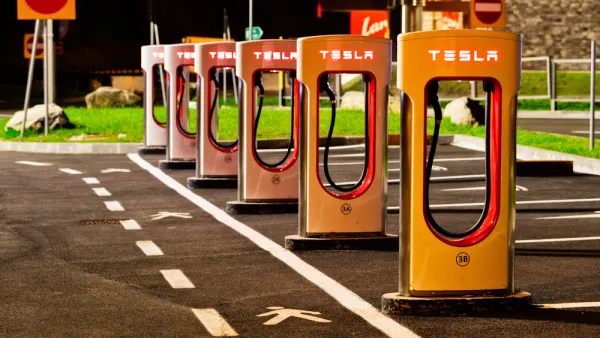A bill will attempt to bring some equity to the flagrantly inequitable rebate program that subsidizes purchases of Electric Vehicles. Additional subsidies would be directed to low income families. Rebates could also be used for car share and transit.
First, the good news: Sales of electric vehicles (EVs) have increased, though not nearly as much as the the California Air Resources Board (CARB or ARB) would like in order to reach its goal of have 1.5 million EVs on the road by 2025.
The bad news: From an equity perspective, California's Clean Vehicle Rebate Project has a long ways to go to reach even moderate income Californians, though considering the selections of EVs (see ARB's Eligible Electric Vehicle list) that is not to be unexpected.
"(T)he generous subsidies are going largely to some of the state's wealthiest residents," writes Jerry Hirsch of the Los Angeles Times. "Nearly four-fifths of the state rebates went to households earning $100,000 or more, according to a state survey of buyers. Nearly half of those getting rebates for Tesla's premium electric sedan earned at least $300,000," he adds.
"A $2,500 rebate to purchase an electric vehicle is not likely to matter to someone earning over $300,000 a year, but it does make a big difference to someone earning $60k a year," said Sen. Kevin de León (D-Los Angeles), recently elected to be the next president pro tem of the state Senate. "Every community deserves clean air, regardless of wealth," he added.
With the state's incentive program constantly running out of funds — about 13,500 buyers are on a waiting list to get their rebate — state lawmakers are now looking to get more of that money into the hands of lower-income drivers.
In April, we noted that ARB was considering capping the prices of EVs eligible to receive rebates. Now a bill, SB 1275, has been introduced by de León that would cap the income of the car buyer as part of a wider effort known as the Charge Ahead California Initiative "to sell mainstream consumers on electric and fuel-cell vehicles," writes Hirsch.
The California bill directs the Air Resources Board to determine income limits for rebates. The board should shoot for a limit that "keeps the program in the black but doesn't slow progress" toward the state's clean vehicle goal, said Maxwell Baumhefner, attorney in the clean vehicles and fuels office of the Natural Resources Defense Council.
Charge Ahead would also allow motorists to "simply retire an older car, without buying a new one, and get $3,000 to pay for a public transit pass or car-sharing program membership," writes Hirsch.
The bill has passed the Senate and will next be considered by the Assembly's appropriations committee. It has until Aug. 31 to gain final passage and move to Gov. Jerry Brown's desk.
[Hat tip to Stan Parkford of Streetsblog San Francisco.]
FULL STORY: Bill would cap income eligibility for state's clean-vehicle rebates

National Parks Layoffs Will Cause Communities to Lose Billions
Thousands of essential park workers were laid off this week, just before the busy spring break season.

Retro-silient?: America’s First “Eco-burb,” The Woodlands Turns 50
A master-planned community north of Houston offers lessons on green infrastructure and resilient design, but falls short of its founder’s lofty affordability and walkability goals.

Delivering for America Plan Will Downgrade Mail Service in at Least 49.5 Percent of Zip Codes
Republican and Democrat lawmakers criticize the plan for its disproportionate negative impact on rural communities.

Test News Post 1
This is a summary

Test News Headline 46
Test for the image on the front page.

Balancing Bombs and Butterflies: How the National Guard Protects a Rare Species
The National Guard at Fort Indiantown Gap uses GIS technology and land management strategies to balance military training with conservation efforts, ensuring the survival of the rare eastern regal fritillary butterfly.
Urban Design for Planners 1: Software Tools
This six-course series explores essential urban design concepts using open source software and equips planners with the tools they need to participate fully in the urban design process.
Planning for Universal Design
Learn the tools for implementing Universal Design in planning regulations.
EMC Planning Group, Inc.
Planetizen
Planetizen
Mpact (formerly Rail~Volution)
Great Falls Development Authority, Inc.
HUDs Office of Policy Development and Research
NYU Wagner Graduate School of Public Service



























